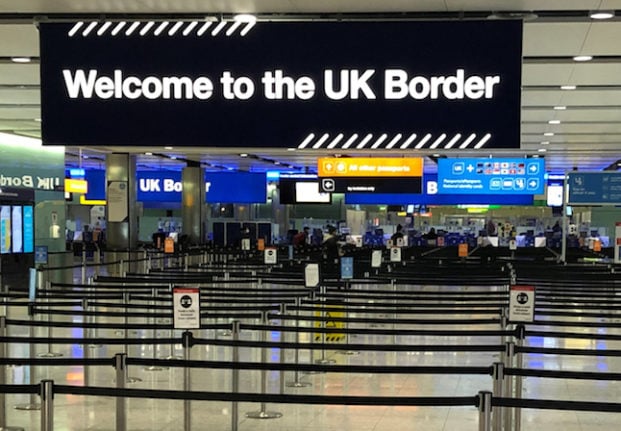The UK government announced its relaxed Covid travel rules on Friday with the main change being that vaccinated travellers from Europe to England would no longer need to take pre-departure tests, and can use cheaper lateral flow (antigen) tests for their ‘Day 2’ test after arriving.
Unvaccinated travellers from Europe would still need to quarantine for 10 days, take a pre-departure test as well as PCR tests on day 2 and day 8 after arrival.
The changes come into force from October 4th.
READ ALSO: Travellers from Europe to England face fewer Covid tests as UK eases border rules
However while the announcement spelled good news for most travellers who had been vaccinated in Europe, certain groups still face quarantine, despite being fully jabbed.
The UK’s Department of Health and Social care confirmed to The Local that there was no change in policy or relaxation of rules regarding those who had received mixed vaccine doses in Europe or those who had received only only jab after recovering from he disease.
So anyone who had one dose of Astra Zeneca and then a dose of Pfizer or Moderna in a European country is not considered fully vaccinated by the UK government.
This practice, known as a Kreuzimpfung (cross vaccination) was relatively common in Austria, with health experts believing it provided greater protection.
The UK government’s rules say those who are vaccinated under an “approved vaccination programme in Europe” – which in many countries includes mixing doses and offering only dose to those recovered from Covid – are considered fully vaccinated.
But a spokesperson for the Department of Health confirmed that there has been no change of rules.
Meaning:
- If you were vaccinated with a 2 dose vaccine (such as Moderna or Pfizer) you must have had both doses to be considered fully vaccinated. Each dose must be with the same (MHRA, EMA, Swissmedic or FDA) approved vaccine. For example, if your first dose was Moderna your second dose must also be Moderna.
- Those who have had COVID-19 and have only had one dose of a 2 dose vaccine must follow the rules for unvaccinated arrivals.
The UK does however accept mixed doses for those travellers vaccinated in the following countries: Australia, Antigua and Barbuda, Barbados, Bahrain, Brunei, Canada, Dominica, Israel, Japan, Kuwait, Malaysia, New Zealand, Qatar, Saudi Arabia, Singapore, South Korea or Taiwan as well as those vaccinated in the UK.
For more details click here.
In several European countries mixing of vaccines has been quite widespread, particularly for those who had a first dose of the AstraZeneca vaccine before guidelines on its use in individual countries changed.
Many countries (including the UK) now advise not using AstraZeneca for younger people after concerns over the risk of rare blood clots. Younger people who already had AstraZeneca for their first dose were advised by many countries’ health regulators to take Pfizer or Moderna for their second dose.
There is no credible medical evidence that individuals who had two different brands of Covid vaccine are less protected against the virus, in fact some studies have suggested better protection from mixing and matching doses.
To make the UK’s decision even more bizarre, its own autumn campaign of booster shots is reported to be based on mixed doses, after some British health advisers said they provide better protection.
The UK’s rules have caused anger to the thousands of vaccinated travellers who still cannot visit the UK without having to quarantine and take expensive tests.
One reader told The Local: “My partner, a British national with mixed vaccines, feels like a second class citizen and hasn’t seen her family since December 2019.”
The Local has asked the Department of Health to explain why the government does not recognised mixed doses from European countries, but does for a list of other countries.
These rules at present affect only arrivals in England, the devolved nations of Scotland, Wales and Northern Ireland have so far not indicated a change to their definitions.



 Please whitelist us to continue reading.
Please whitelist us to continue reading.
Member comments